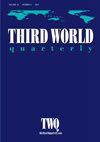The failure of (neo-)extractivism in Latin America – explanations and future challenges
IF 1.8
2区 经济学
Q2 DEVELOPMENT STUDIES
引用次数: 2
Abstract
Abstract The article scrutinises the failure of neo-extractivism in Latin America. Parallel to the global super cycle of commodity prices, many Latin American governments turned to the left and promised redistribution and development, particularly for the poor. Empirically we show that neo-extractivism has become a veritable development model since the beginnings of the 2000s for many Latin American societies. We further show that the recent favourable commodity conjuncture did not translate into diversification and a shift towards non-extractivist sectors away from neo-extractivism, however. In short: neo-extractivism failed. Analysing this failure needs to focus on the underlying political economic conditions that make such a development model possible in the first place, that are reinforced by that very model, and that are prone to crisis; that is, economic rents and their appropriation. We state that the root cause of the emergence as well as the failure of neo-extractivism in Latin America lies in the prevalence of rents. We call for a renewed interest in rent theory and a shift towards political economy in the analysis of development拉丁美洲(新)榨取主义的失败——解释和未来挑战
摘要本文考察了新榨取主义在拉丁美洲的失败。与大宗商品价格的全球超级周期平行,许多拉美政府转向左翼,承诺再分配和发展,特别是针对穷人。我们的经验表明,自2000年代初以来,新采掘主义已成为许多拉丁美洲社会名副其实的发展模式。然而,我们进一步表明,最近有利的商品形势并没有转化为多样化和从新采掘主义转向非采掘主义部门。简而言之:新开采主义失败了。分析这一失败,需要把重点放在根本的政治经济条件上,这些条件首先使这种发展模式成为可能,这种模式又加强了这些条件,而且容易发生危机;也就是经济租金及其占有。我们指出,新榨取主义在拉丁美洲出现和失败的根本原因在于租金的盛行。我们呼吁重新关注租金理论,并在分析发展时转向政治经济学
本文章由计算机程序翻译,如有差异,请以英文原文为准。
求助全文
约1分钟内获得全文
求助全文
来源期刊

Third World Quarterly
DEVELOPMENT STUDIES-
CiteScore
4.10
自引率
15.00%
发文量
137
期刊介绍:
Third World Quarterly ( TWQ ) is the leading journal of scholarship and policy in the field of international studies. For almost four decades it has set the agenda of the global debate on development discourses. As the most influential academic journal covering the emerging worlds, TWQ is at the forefront of analysis and commentary on fundamental issues of global concern. TWQ examines all the issues that affect the many Third Worlds and is not averse to publishing provocative and exploratory articles, especially if they have the merit of opening up emerging areas of research that have not been given sufficient attention. TWQ is a peer-reviewed journal that looks beyond strict "development studies", providing an alternative and over-arching reflective analysis of micro-economic and grassroot efforts of development practitioners and planners. It furnishes expert insight into crucial issues before they impinge upon global media attention. TWQ acts as an almanac linking the academic terrains of the various contemporary area studies - African, Asian, Latin American and Middle Eastern - in an interdisciplinary manner with the publication of informative, innovative and investigative articles. Contributions are rigorously assessed by regional experts.
 求助内容:
求助内容: 应助结果提醒方式:
应助结果提醒方式:


